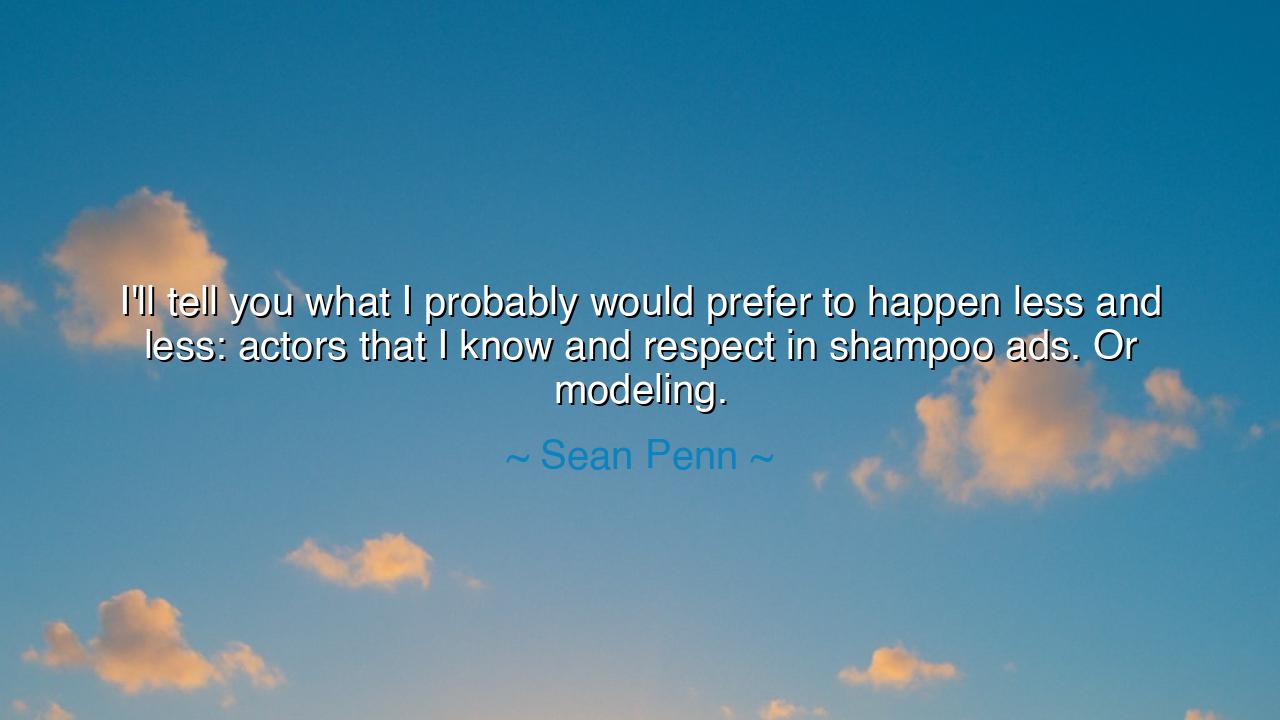
I'll tell you what I probably would prefer to happen less and
I'll tell you what I probably would prefer to happen less and less: actors that I know and respect in shampoo ads. Or modeling.






When Sean Penn said, “I’ll tell you what I probably would prefer to happen less and less: actors that I know and respect in shampoo ads. Or modeling,” he was not speaking merely of advertisements or vanity — he was speaking of honor, of purpose, and of the quiet erosion of art in an age that worships appearances over truth. Beneath the bluntness of his words lies the lament of a man who sees the sacred craft of storytelling diluted into spectacle, and who mourns how often greatness bows before gold. Like a philosopher of the stage, Penn reminds us that the true artist must guard the integrity of his soul — that he must not trade the flame of meaning for the glitter of approval.
The actor, in the ancient sense, was more than a performer. He was the vessel of human experience, the mirror of the gods, the voice through which joy and sorrow found form. In the theaters of Athens, when Sophocles wrote of kings and fate, the actor stood as priest and prophet alike, revealing the moral heart of humankind. To act was not to entertain — it was to awaken, to heal, to confront truth. Thus, when Penn laments seeing his peers reduced to models in shampoo ads, he is not scorning their success — he is grieving their surrender. For when the calling of art becomes the currency of image, something eternal is lost.
The ancients, too, warned of this seduction. Plato, in his dialogues, cautioned that art untethered from truth becomes illusion — and illusion, when worshiped, enslaves the mind. Likewise, in every age, there are those who trade the sacred for the shallow, who forsake the temple of meaning for the marketplace of applause. Penn’s words, though modern in tone, echo this timeless struggle. He speaks as one weary of seeing respectable artists — those who once sought truth — bend their purpose to sell desire, beauty, or comfort. To him, it is not the selling of shampoo that wounds the soul, but the selling of one’s essence.
We can find a mirror of this wisdom in the life of Vincent van Gogh. He died poor and uncelebrated, yet refused to paint for commerce. The world mocked his obsession with color and light, but he painted not for gain — he painted for truth. His art was prayer, not product. Only after his death did the world realize that his madness was vision, that his hunger was devotion. He never made an advertisement, never sought the flattery of fame — and yet his work became immortal. From this we learn that greatness is not found in recognition, but in authenticity, in the relentless pursuit of meaning even when the world does not understand.
Penn’s disdain for modeling and endorsements is thus not arrogance, but reverence — reverence for the art that has been his life’s altar. He calls upon all who create to remember why they began: not to be admired, but to move hearts, not to be seen, but to reveal. In a time when fame is bought with attention rather than earned through depth, his voice rings like a warning bell through the fog of vanity. The artist who forgets his purpose becomes a mannequin in the marketplace, a hollow figure wearing the mask of brilliance but none of its fire.
The lesson, then, is this: Guard the purity of your craft. Whether you are an artist, a teacher, a builder, or a leader, do not trade your purpose for praise. There will always be temptations — the easy reward, the quick acclaim, the glitter that blinds the eye. But remember, the ancients honored not those who were adorned, but those who endured. True respect is not earned by exposure, but by excellence; not by beauty, but by truth. The world may forget a thousand faces, but it will never forget a soul that refused to betray its gift.
And so, O seeker of meaning, let Penn’s words be a torch for your own path. Whatever your calling, do it with integrity. Do not let your purpose be packaged and sold. Create what is real, not what is convenient. Stand firm in your craft, even when the world applauds the false and ignores the faithful. For art — and life itself — loses its sanctity the moment it becomes a commercial. The ancients would have said: “Better to labor in obscurity with honor than to shine falsely for the crowd.” Thus, take up your own work as a sacred act — not for the market, but for the soul.






AAdministratorAdministrator
Welcome, honored guests. Please leave a comment, we will respond soon